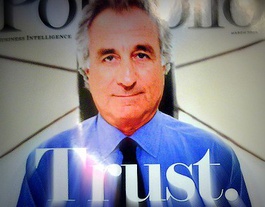
Fraud: Bernard Madoff's 65 million dollars and Europe
Published on
Translation by:
 Jonny S
Jonny S
The trial of the Wall Street king has been ongoing in New York since the beginning of March 2009, with him facing up to 150 years in prison. Several European countries are amongst the victims of this fraud of epic proportions
 The news on 11 December 2008 was as if a bomb had gone off considering the current world financial crisis. Bernard Madoff was allegedly behind one of the greatest cases of fraud in history. The 70-year-old American apologised on the first day of his trial in New York on 12 March 2009, saying he was ‘deeply sorry and ashamed’. He was imprisoned the same night after having pleaded guilty to the eleven charges against him. The one-time lifeguard who taught himself finance and became the president and founder of an investment firm now faces up to 150 years imprisonment. Over the years he enticed multi-millionaires and in particular bank groups through his fraudulent pyramid scheme (also known as a ‘Ponzi’ scheme), assuring them exceptional returns.
The news on 11 December 2008 was as if a bomb had gone off considering the current world financial crisis. Bernard Madoff was allegedly behind one of the greatest cases of fraud in history. The 70-year-old American apologised on the first day of his trial in New York on 12 March 2009, saying he was ‘deeply sorry and ashamed’. He was imprisoned the same night after having pleaded guilty to the eleven charges against him. The one-time lifeguard who taught himself finance and became the president and founder of an investment firm now faces up to 150 years imprisonment. Over the years he enticed multi-millionaires and in particular bank groups through his fraudulent pyramid scheme (also known as a ‘Ponzi’ scheme), assuring them exceptional returns.
Some European countries are more affected than others. Switzerland risks losing up to five billion euros but Spain appears to be the European country the worst hit. Those that have invested in the largest bank in the country, Santander, and its investment fund Optimal could be exposed to losses of more than three billion euros. In France, banks (BNP Paribas), insurance companies and individuals are affected, losses stand at more than 500 million euros and the first death arising from the fraud was that of a Frenchman, Thierry de la Villehuchet. An expatriate in New York, the financier committed suicide in December after having lost considerable sums of his clients’ money. The English bank HSBC, number 3 in the world could have lost up to a billion euros and the Royal Bank of Scotland could
have lost up to 450 million euros.

Reform capitalism?
As the days go by the affair is becoming clearer but the real losses are still difficult to add up. Potential accomplices are beginning to appear, such as the certified public accountant, David Friehling, charged with falsifying accounts and documents. The numbers of legal proceedings and enquiries are also on the rise. Several complaints and enquiries have been opened against BNP Paribas and also UBS in France for their role in this affair. The situation is similar in England, Italy, Spain and other affected countries. People are asking how the fraud lasted for such a long time. Some are accusing banks such as HSBC of not having respected European regulation. The victims, his clients, are looking to impose a greater transparency and responsibility on the national authorities in charge of controlling these funds. According to a Spanish law firm, it appears there are more than three million direct and indirect victims of the Madoff affair. This raises a number of questions. The debate on hedge funds and the diversity of European regulation has been reopened.
There are more than three million direct and indirect victims of the Madoff affair
In January, following the European commission’s recommendations, the go-ahead was given for the ‘coordination of laws, regulations and administrative provisions relating to undertakings for collective investment in transferable securities (UCITS). These UCITS funds introduced in 1985 are popular in the European banking sector and different in substance to American funds. In a global context, the affair has stepped-up projects reforming capitalism. To this effect, European leaders met for the European council on 19 and 20 March in Brussels and came to an agreement on strengthening EU financial sector regulation. The aim is to set an example and be united to convince their, still reluctant, American partners of the need for global reform of capitalism during the G20 summit in London on 2 and 3 April.
Translated from Madoff : les conséquences de l’imposture en Europe


